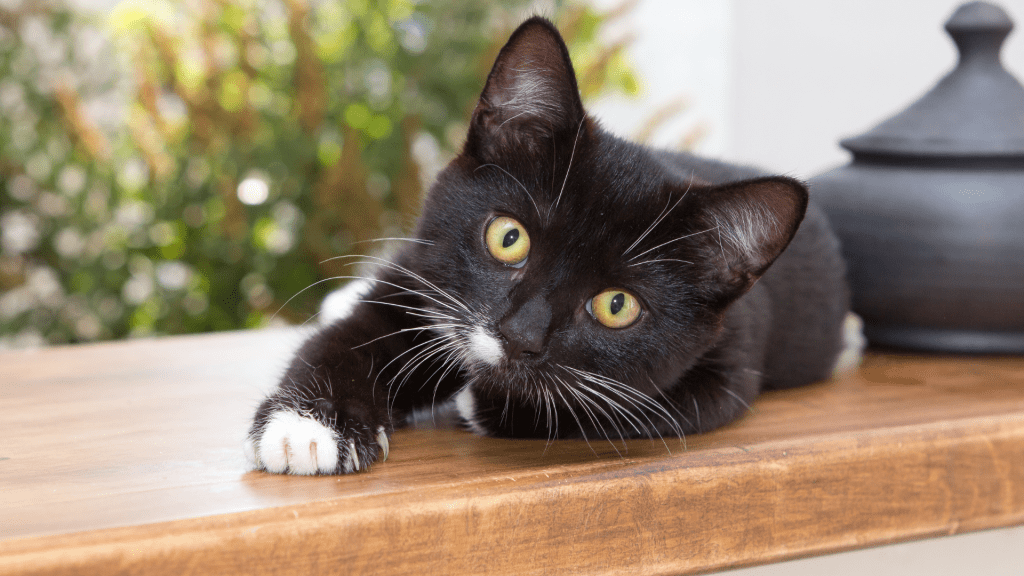As a cat owner, you may be wondering if it is safe to share your favorite foods with your furry friend. Croissants are a delicious and flaky bread that is enjoyed by many people as a breakfast food. However, can cats eat croissants?
While it may seem like a harmless treat to give your cat a small piece of croissant, it is important to consider the potential risks and nutritional needs of your feline companion. In this article, we will explore the safety of giving croissants to cats and provide alternatives for treats that are suitable for their dietary needs.
What Are Croissants?
Croissants are a type of bread that is made from buttery, flaky layers of dough. They are a popular breakfast food, often enjoyed with coffee or tea. Croissants originated in Austria and are now popular in many countries around the world.

They are made by layering dough and butter, then rolling and folding the dough to create many layers. The dough is then shaped into a crescent shape and baked until it is golden brown. Croissants can be served plain, or they can be filled with a variety of fillings such as chocolate, jam, or cheese. They are often considered a luxury food due to their rich, indulgent taste and texture.
Additionally, croissants are high in calories and fat, which can also be harmful to cats if they are not able to burn off the extra energy. Cats are obligate carnivores, which means that they require a diet that is high in animal protein and low in carbohydrates. While a small piece of croissant may not be harmful to your cat in the short term, it is not a healthy or nutritionally balanced treat for them.
Can Cats Eat Croissants?
The short simple answer is no, cats should not eat croissants. While it may seem harmless to give your feline friend a small piece of croissant as a treat, there are a few reasons why it is not a good idea.
First, croissants are made with ingredients that are not suitable for cats. They contain wheat flour, butter, and sugar, all of which can be harmful to cats if ingested in large quantities. Wheat flour can cause digestive issues, and butter can lead to pancreatitis, a serious condition that affects the pancreas. Sugar is not toxic to cats, but it is not nutritionally necessary for them and can contribute to obesity and other health problems if consumed in excess.
Reasons Why You Should Not Feed Your Cat Croissants.
Croissants contain ingredients that can be harmful to cats if ingested in large quantities. Wheat flour, which is a main ingredient in croissants, can cause digestive issues in cats such as bloating and diarrhea.
Butter, another ingredient in croissants, can lead to pancreatitis, a serious condition that affects the pancreas and can cause abdominal pain and vomiting. Sugar is not toxic to cats, but it is not nutritionally necessary for them and can contribute to obesity and other health problems if consumed in excess.
Croissants are also high in calories and fat, which can be harmful to cats if they are not able to burn off the extra energy. Cats are obligate carnivores, which means that they require a diet that is high in animal protein and low in carbohydrates.
While a small piece of croissant may not be harmful to your cat in the short term, it is not a healthy or nutritionally balanced treat for them. A diet high in fat and calories can lead to weight gain and other health problems in cats. It is important to consider the nutritional needs of your cat when choosing treats and snacks.
Alternative Croissant Treats For Your Cat
There are many commercial cat treats available that are specifically formulated to meet the nutritional needs of cats. These treats often contain high-quality protein sources such as chicken or fish and are low in carbohydrates and added sugars. They are a convenient and safe option for rewarding your cat and providing them with a tasty treat. It is important to read the ingredient list and nutrition information on cat treats to ensure that they are appropriate for your feline friend.
In addition to commercial cat treats, you can also give your cat small pieces of cooked chicken or fish as a treat. These protein-rich treats are a good option for cats, as they are high in animal protein and low in carbohydrates. Be sure to remove any bones or skin from the meat before giving it to your cat, as these can be choking hazards or cause digestive issues. It is also important to only give these treats in moderation, as an excess of any treat can lead to weight gain and other health problems.
Cat Kittens Eat Croissants?
It is not a good idea for cat kittens to eat croissants. Like adult cats, cat kittens should not eat croissants due to their ingredients and nutritional content. Croissants contain wheat flour, butter, and sugar, which can be harmful to cats if ingested in large quantities. Wheat flour can cause digestive issues, and butter can lead to pancreatitis, a serious condition that affects the pancreas. Sugar is not toxic to cats, but it is not nutritionally necessary for them and can contribute to obesity and other health problems if consumed in excess.

Additionally, croissants are high in calories and fat, which can be harmful to cat kittens if they are not able to burn off the extra energy. Cat kittens have specific nutritional needs and should be fed a diet that is high in animal protein and low in carbohydrates. While a small piece of croissant may not be harmful to your cat kitten in the short term, it is not a healthy or nutritionally balanced treat for them. It is always best to stick to cat-specific treats and foods to ensure that your furry friend is getting the nutrients they need to grow and develop properly.
Final Thoughts
It’s not a good idea for cats to eat croissants. While a small piece of croissant may not be harmful to your cat in the short term, the ingredients and high fat and calorie content make them an unhealthy choice for cats. Croissants contain ingredients such as wheat flour, butter, and sugar, which can be harmful to cats if ingested in large quantities. Wheat flour can cause digestive issues, and butter can lead to pancreatitis, a serious condition that affects the pancreas. Sugar is not toxic to cats, but it is not nutritionally necessary for them and can contribute to obesity and other health problems if consumed in excess.
